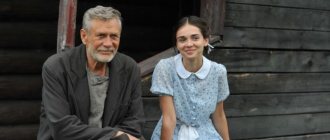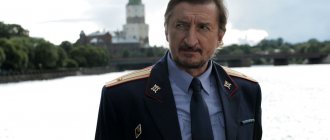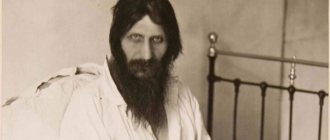Childhood and youth
Rodion Rafailovich Nakhapetov was born in January 1944 in the Ukrainian city of Pyatikhatki. The birth was difficult. During the Great Patriotic War, my mother Galina Prokopenko was a liaison officer for an underground organization. While pregnant, the woman was performing an important task. On the way to the goal, Galina was captured.
View this post on Instagram
A post shared by Manush Danilyan-Agababova (@manushdanilyan) on Nov 4, 2020 at 12:25pm PST
Actor Rodion Nakhapetov
At the last moment, the execution was replaced by a concentration camp, from where the underground woman managed to escape. In the last month of pregnancy, the woman came under bombing. In the ruins of one of the houses in the town of Pyatikhatki, Dnepropetrovsk region, she gave birth to a son, calling him the same as the underground organization - Rodina. In everyday life the boy was called Radik.
At the end of the war, Radik Nakhapetov’s father, Rafail Tatevosovich Nakhapetov, an Armenian by nationality, went to his homeland, where he had a family. For a long time, the boy considered his father to have died at the front. At first, Galina Prokopenko and her son lived with their mother in a village in Krivoy Rog. Then the woman got a job as a teacher at a school in Dnepropetrovsk. In 1951, she was diagnosed with tuberculosis and hospitalized. Rodina lived in an orphanage until 1954.
Rodion Nakhapetov (still from the film “Tenderness”)
When Nakhapetov received his passport, the passport office employee decided that the name Rodina was a typo. Thus Nakhapetov received the name Rodin. And he became Rodion when his first film was released, and the editors inserted the letter “o” into the incomprehensible name.
In his youth, Rodion, like many of his peers, dreamed of the Nakhimov School. But one day the boy was assigned to play a bear at a New Year's performance. It was then that Nakhapetov first thought about acting. Soon he began attending a drama club.
After graduating from school, the young man becomes a student at VGIK on his first try, graduating in 1965.
Biography
Born on January 21, 1944 in the city of Pyatikhatki, Dnepropetrovsk region of the Ukrainian SSR, during the bombing in the ruins of one of the houses where his mother, a liaison officer of the underground organization “Motherland,” was hiding. As Rodion Rafailovich later recalled[1]:
“Shortly before giving me life, my mother received a special task: she had to cross the front line and transfer important information from the partisans to the active army. On this path, she went through difficult trials: she was sentenced to death, escaped from a concentration camp, completed her assignment, and on her way back, came under a terrible bombing in the city of Pyatikhatki. I was born during this bombing. Mom had to cover me with a pillow, protecting me from fragments and stones that rained down from everywhere..."
Mother - Galina Antonovna Prokopenko (1922-1966), Ukrainian, worked as a teacher in a rural school, father - Rafail Tatevosovich Nakhapetov[2] - Armenian[3]. They met Rodion Nakhapetov’s mother in a partisan detachment in Krivoy Rog. After the end of the Great Patriotic War, my father returned to Armenia, where he already had a family. Until the age of ten, Rodion Nakhapetov considered his father to have died in the war[1][4].
For some time, Rodion Nakhapetov had a stepfather, a school mathematics teacher, who left the family during the period that coincided with the onset of his mother’s illness[4].
After the war, he lived with his grandmother in the village of Skalevatka in Krivoy Rog, from where he moved with his mother to Dnepropetrovsk in 1949. During the first years in Dnepropetrovsk, the family rented a corner with a bed and was in severe financial need. Rodion’s mother first worked as a pioneer leader in a pioneer camp, and from September 1950 as a teacher of Ukrainian language and literature at secondary school No. 34 in Dnepropetrovsk.
In 1951, her mother, at the age of 29, was diagnosed with tuberculosis, for which she was hospitalized, and the young Rodion Nakhapetov, with the assistance of the school, was sent to be raised in an orphanage in Novomoskovsk[5]. In 1954, after being discharged from the hospital, his mother took Rodion from the orphanage[6].
Working for some time as a teacher in a camp for political prisoners, Rodion’s mother helped the prisoners by handing over their letters to the outside world. In the spring of 1962, after she wrote a letter to N. Khrushchev so that he would figure everything out, for her activity in helping political prisoners she was assigned to treatment in a psychiatric hospital on Igreni. After some time, Rodion managed to rescue her from there, but she soon died of cancer, which he believed was caused by the injections[4]. Later, Nakhapetov made a film about this case, “The Asylum” (“Infection” [7]). According to Nakhapetov’s recollections, working on the script had an extremely strong emotional impact on him[8].
Poor post-war life and constant material need strengthened Nakhapetov’s character and fostered the desire to escape poverty at any cost and become a famous person. Already a well-known Soviet actor, having arrived in Dnepropetrovsk in the early 1970s, Nakhapetov said at a meeting with a childhood friend that he would probably never return to this city [4].
Childhood friends recall that Nakhapetov was an uncommunicative, but docile and unpugnacious boy. He didn’t like to go out with friends, preferring playing chess, reading books, and participating in a drama club to entertainment. He suffered from allergies, from which, contrary to expectations, he was cured with water from an unremarkable source in a city park, succumbing to the trick of his friends, who pulled him out for a walk in this way[6].
Nakhapetov’s closest friend was the actor Zhenya Bezrukavy, who graduated from the same school No. 34. Following him, Rodya went to the Dnepropetrovsk Theater School, earning the nickname “acture” from the street kids. The nickname did not upset him, but only pushed him to take decisive action, and, without finishing his studies, he left for Moscow in 1960[9].
Thanks to his mother, who paid great attention to his upbringing, Nakhapetov became interested in science fiction literature while still at school. He was involved in a ship-making group and was seriously interested in drawing and music, but for family reasons he was unable to develop these skills. The strongest was his passion for theater, which was facilitated by classes in the drama club at the Palace of Culture, where he acquired his first acting skills. Nakhapetov’s desire to become an actor strengthened after he attended a creative meeting with famous actors of Russian cinema of that time - Boris Andreev, Marina Ladynina, Sergei Bondarchuk[6][5].
After graduating from school[10], at the age of 16, on the first try he entered the acting department of VGIK (workshop of Yuli Raizman). Due to the fact that Raizman, due to his busy filming, paid little attention to the group, the future actor was trained by the Moscow Art Theater actor Anatoly Grigorievich Shishkov, as well as teachers Alexander Alexandrovich Bender and Emilia Kirillovna Kravchenko. Rodion Nakhapetov graduated from the acting department of VGIK in 1965[6][5][11].
In 1972, Rodion Nakhapetov graduated from the directing department of VGIK (workshop of Igor Talankin)[11]. Since 1978 - actor and director at the Mosfilm film studio[6][12].
By the end of the 1980s, Nakhapetov no longer saw any prospects for himself in the new Russian cinema. Nakhapetov’s film “At the End of the Night,” shot at Mosfilm, but not widely recognized in the USSR, is bought by the famous Hollywood film studio “20th Century Fox”[13]. In 1989, Nakhapetov, at the invitation of his friend, left to work in the USA[11], remaining for permanent residence[5][11][12]. Soon after leaving, Nakhapetov divorced Vera Glagoleva, leaving her with their two children, and married his manager Natalya Shlyapnikoff, who was working at the time at the US Independent Television Association[5].
Since 2003, Nakhapetov has been permanently living and working in Russia[6].
History of the name
Nakhapetov’s mother named her son “Motherland” in honor of the partisan detachment. At school, friends called him Radik for short. Later, when Nakhapetov received a passport, in the passport office of Dnepropetrovsk, considering that the word “homeland” was feminine, the last letter was removed and the name was written down as “Rodin”, that is, masculine[4]. After filming the film “First Snow,” the editor, looking at the credits, decided that this was a mistake and corrected the “typo” by entering the “missing” letter. So the Motherland of Nakhapetov became Rodion Nakhapetov[1][6].
Personal life
Rodion Nakhapetov’s first wife is Vera Glagoleva (1956-2017), whom he met on the set of his film “To the End of the World,” and has two daughters: Anna (born 1978), actress and ballerina, ballet dancer of the Bolshoi Theater, and Maria ( born 1980), graduated from the art department of VGIK. In 2006, granddaughter Polina was born from her daughter Anna. In 2007, their grandson Kirill was born from their daughter Maria, and in 2012 their grandson Miron.
Currently, Rodion’s wife is Natalya Alekseevna Shlyapnikoff, a US citizen from a family of Russian emigrants, a film and television producer[1][4][6].
His maternal great-uncle, Ignat Alekseevich Moiseenko, is known as the writer Ignat Prostoy.
Charity
In 1993, together with Natasha Shlyapnikoff, he created a charitable foundation to help children with congenital heart defects “Nakhapetov friendship foundation” [14][15].
Movies
The cinematic biography of Rodion Nakhapetov began in his student years. Her debut was the role of Gena in the film “There Lives Such a Guy” by Vasily Shukshin. The 19-year-old actor of average height and build (height - 170 cm, weight - no more than 70 kg) portrayed on the screen as an engineer who had already graduated from college. In the same 1964, Nakhapetov starred in the second film, “First Snow,” where viewers saw him in the image of the poet Kolya. A year later, director Marlen Khutsiev invited the young actor to his film about the youth of the 60s, “I’m Twenty Years Old.”
Rodion Nakhapetov as Vladimir Lenin (still from the film “Mother’s Heart”)
After graduating from VGIK, Nakhapetov was noticed by director Mark Donskoy, inviting him to play a role in his dilogy “Mother’s Heart” and “Mother’s Loyalty.” In these films, the actor played Vladimir Lenin at a young and mature age.
After the successful premiere of the film, Rodion realized that he was now doomed to constantly play the leader of the world proletariat in patriotic films. When Donskoy invited him to play the same role in the film “Nadezhda,” the artist had to tactfully refuse the master. The film director did not take offense at Nakhapetov for long - Andrei Myagkov played Vladimir Ilyich no worse than Rodion.
Fame came to the actor after the release of two films by Elyor Ishmukhamedov entitled “Tenderness” and “Lovers” on Soviet screens, where Nakhapetov’s partners were the bright beauties Maria Sternikova and Anastasia Vertinskaya. Photos of the young artist began to regularly appear in leading Soviet film magazines.
Rodion Nakhapetov (still from the film “Lovers”)
After these films, he gained the image of a taciturn intellectual, in a sense, a hero of his time. In the last film, Rodion Nakhapetov played an explosives fireman, whom the director endowed with some biographical information about the actor himself. Even the name Rodin was taken from the artist’s biography.
Nakhapetov received his first award after the release of the film “No Password Required” directed by Boris Grigoriev. For the role of intelligence officer Isaev, the jury of the All-Union Film Festival awarded him first prize.
Particular popularity and audience sympathy came to Rodion after the role of cameraman Pototsky in the drama “Slave of Love.” This film by Nikita Mikhalkov was released in 1976 and was watched by millions of Soviet viewers.
Rodion Nakhapetov as Alexander Belobrov (still from the film “Torpedo Bombers”)
Another cinematic work that raised the artist to a new level is the role of the courageous naval aviator Alexander Belobrov. The film “Torpedo Bombers” was released in 1983 and brought Nakhapetov the Dovzhenko Silver Medal and the USSR State Prize.
In 2004, 35 years after the release of Ishmukhamedov’s film “Lovers,” which brought Rodion Rafailovich his first popularity, the film “Lovers-2” was released, where the artist again played the former hero Rodin, who had aged 20 years.
Creative activity
IN THE USSR
Actor
Even at the institute, Nakhapetov, showing a serious and respectful attitude to his studies and easily improvising, was able to achieve maximum expressiveness of the image of his heroes. By the end of VGIK, Rodion Nakhapetov had already played two main roles to defend his diploma - engineer Gena
in the film “There Lives Such a Guy” (1964) directed by Vasily Shukshin and the young poet
Kolya Terentyev
in the film “First Snow” (1964) directed by Boris Grigoriev and Yuri Shvyrev. At the same time, he starred in a film about youth in the 1960s, “I’m Twenty Years Old” (another title is “Ilyich’s Outpost”) directed by Marlen Khutsiev[16].
From the very first film role, the actor’s character showed individuality, inner restraint and strength[5]. Rodion Nakhapetov initially approached the study of the character of his heroes as a mature professional actor. Thus, for an organic infusion into the image of V. Lenin in the dilogy directed by Mark Donskoy “Mother’s Heart” (1965) and “Loyalty to a Mother” (1966), in which he played three roles of Vladimir Lenin of different ages - young, young and mature, Rodion re-read a number of Lenin’s articles and books. This work served as an exam for the professional and human maturity of the actor[6][11]. Creative collaboration with Mark Donskoy largely determined Nakhapetov’s attitude towards his profession and shaped him as an actor. It is known that Mark Donskoy treated Rodion in a fatherly manner and with great warmth.
Popularity and audience love for Rodion Nakhapetov came after the films “Tenderness” (1966) and “Lovers” (1969) shot at the Uzbekfilm film studio, directed by Elyor Ishmukhamedov, with whom Nakhapetov became friends at the institute. In three short stories of the film “Tenderness” Nakhapetov ( Timur
) touchingly, but without sweetness, plays unrequited love-premonition that suddenly and tragically ended. In the film “Lovers” that soon followed, Rodion plays an explosives fireman, whom the film’s authors endowed with some biographical information about Rodion Nakhapetov himself and gave him the actor’s former name - Rodin. It was after these works that the actor acquired the role of a taciturn, intelligent young man of the 1960s, in a certain sense, a hero of his time[4][5][11].
For the role of intelligence officer Maxim Isaev in the film “No Password Required,” directed by Boris Grigoriev and Yuri Shvyrev, Rodion Nakhapetov was awarded a prize at the 1968 All-Union Film Festival.
Performed by Rodion Nakhapetov, viewers remembered the role of the temperamental revolutionary - left-wing extremist Benedicto from a fictional Latin American country in the action-packed film “That sweet word is freedom!” (1972) directed by Vytautas Zalakevicius. Rodion Nakhapetov received particular popularity and audience sympathy by playing the role of cameraman Viktor Pototsky in Nikita Mikhalkov’s historical adventure drama “Slave of Love” (1976). An undoubted acting success is the role of the courageous naval pilot, senior lieutenant Alexander Belobrov in the heroic film story - the film “Torpedo Bombers” (1983) directed by Semyon Aranovich. For this work, Nakhapetov was awarded the Dovzhenko Silver Medal and the USSR State Prize[4][5][11].
In 2004, thirty-five years after the release of the film “Lovers,” Rodion Nakhapetov again starred with director Elyor Ishmukhamedov in the film “Lovers-2,” in which he played his former hero, Rodin, who had aged twenty years.
Director
While still a student in the acting department of VGIK, Rodion Nakhapetov was invited to study in his director’s workshop by Igor Talankin. But only a few years later, after working with Mark Donskoy on the duology “Mother’s Heart” and “Loyalty to a Mother,” being already an established actor, Rodion Nakhapetov decided to take up directing. Nakhapetov’s first directorial attempts were two educational short films - “Remember?” and Dandelion Wine (1972). The first picture, based on personal memories, is about a boy who lived in an orphanage, about the formation of character. The second is a film adaptation of the story of the same name by Ray Bradbury based on music[5].
Nakhapetov’s first full-length directorial work was the film “With You and Without You” (1973), which he presented at the San Francisco International Film Festival in 1975 and later received an award at the annual Femina film screening in Belgium (1976)[6] [5]. This film is a love story between the heroes Marina Neyolova and Juozas Budraitis against the backdrop of the dispossession of wealthy farmers[5][11].
Rodion Nakhapetov’s second film, “To the End of the World...” (1975), won the Grand Prize at the International Film Forum “Man - Labor - Creativity” in Ljubljana (1976). The film was subject to numerous edits and was difficult to release, but was a success with audiences. The main role in the film was played by Vera Glagoleva, who later became the director’s wife.
From the first films, the main theme of Nakhapetov’s directorial works was love, the fight against the passage of time, upholding hopes or their loss under the pressure of circumstances. To perform the roles in the film adaptation of Maxim Gorky’s play “Enemies,” Rodion Nahapetov gathered a whole constellation of talents: Innokenty Smoktunovsky, Nikolai Gritsenko, Nikolai Trofimov, Elena Solovey, Marina Neyolova, Regimantas Adomaitis, Juozas Budraitis, Vera Glagoleva[5][11].
In 1980, Nakhapetov, based on the story by Boris Vasiliev, directed the television film “Don’t Shoot White Swans,” which received a prize at the All-Union Film Festival of Television Films in Yerevan (1981). The film tells about the complex relationship between man and society, love for nature, humanism and justice. Like previous works, the film had difficulty passing censorship barriers, but on the screen it was a huge success with audiences.
Already famous actors Stanislav Lyubshin and Nina Ruslanova starred in the leading roles.
As a result of disagreement with the fact that the final version of the script differed significantly from the story, Boris Vasiliev, who participated in the creation of the script, demanded that his name be removed from the credits[5][11]. The musical film “About You” (1981), with Vera Glagoleva in the title role, received the “Golden Nymph” prize at the International Film Festival in Monte Carlo (1983). This is a film about a heroine endowed with the gift not to speak, but to sing, who is at odds with herself due to a compromise with the outside world[5][11].
The last film Nakhapetov shot in the USSR was “At the End of the Night.” Despite the lack of great audience success in the USSR, the film was acquired by the Hollywood major XX Century Fox for worldwide film distribution[6][5].
In addition to his main directorial work, R. Nakhapetov also tried himself as a composer, writing music for two documentaries[11].
IN THE USA
After moving to the USA, initial attempts to realize himself in American cinema, despite the active support of his new wife, were unsuccessful[13]. The numerous scripts and synopses he wrote turned out to be unclaimed, and only two years later, in 1992, when Rodion Nakhapetov and his wife Natalya were about to return to Russia, he managed to sign the first Hollywood contract to shoot the action-packed feature film “Telepath” (“Stir”) Written by Eric Lee Bowers
), which was released in 1997. The main roles were played by such well-known and popular actors in the USA as Michael J. Pollard, Karen Black, Tony Todd, Reno Wilson[en] and others. The director himself also appeared in a small role[6].
In this film, the director worked for the first time in a film genre that was new to himself, but popular among American audiences - the science-fiction thriller[11]. According to the director himself, if in the USSR he, as a rule, made dramas, then “while living in America, I wanted to try myself in a different genre, which seemed to me to be more in demand here - the suspense-thriller genre. It was interesting for me to explore new artistic territory.”[13]
To shoot this film, Nakhapetov and his wife created their own cinema in 1995, on which, after “Telepath”, in collaboration with the ORT channel, they filmed three “American” episodes of the popular CIS television series “Deadly Force-2” under the general title “Mission” doable." Nakhapetov took part in the filming of these episodes as an actor, director and producer[17].
The success of this cooperation led to the implementation of the next joint Russian-American project - the creation of a 12-episode action-packed detective television film "Russians in the City of Angels", which was released in 2002. The script for the film was written by Rodion Nakhapetov. In this film by Nakhapetov, in addition to Karen Black, who had previously starred with him, such American cinema stars as Eric Roberts starred
), Lane Davies
,
Sean Young
,
Gary Busey
,
Erik Estrada
, as well as famous and beloved Russian film actors: Lev Durov, Vladimir Steklov, Valery Nikolaev, Lidiya Fedoseeva -Shukshina, Ekaterina Rednikova and others. The main role was played by Nakhapetov himself. His eldest daughter Anna starred in one of the roles in this film.[18]
Nakhapetov shot the next full-length thriller film “Border Blues” based on his own script with an already established cast. The main roles in the film were played by Eric Roberts, Gary Busey, Eric Estrada, Ekaterina Rednikova and Vladimir Steklov, who starred in the director’s previous film. The film was released in 2004. The film's budget was $10,000,000.
In the same year, it was filmed by a director in Russia at the Central Partnership film studio based on a script by Hanna Hovhannes Oganesyan-Slutski
) multi-part lyrical comedy “My Big Armenian Wedding.” The roles in the film were played by stars of Armenian and Russian cinema Armen Dzhigarkhanyan, Marat Basharov, Maria Shukshina, Natalya Andreichenko and others. The director played a small role in the film as the father of the main character.
After “The Armenian Wedding,” Nakhapetov wrote a script and based it on it at his film studio, the psychological thriller “Contamination.” The script is partly based on real events that happened in the early 1960s with the director's mother[19].
Along with the director's regular actors - American film stars Eric Roberts and Karen Black, famous Russian actors - Andrei Smolyakov, Igor Artashonov, Alexander Andrienko and others - also starred in this Russian-American film. The director’s youngest daughter, Maria, also played a role in the film. The film was released in 2007. In 2008, at the Golden Phoenix film festival, the director for this film received a Special Award from the Guild of Film Actors of Russia in the nomination for promoting Russian culture in world cinema[20].
In addition to feature films, Nakhapetov shot three full-length documentaries at the RGI Productions studio[4][5].
State awards and titles
- 1967 - Honorary title “Honored Artist of the RSFSR” - for services in the field of Soviet cinema
[21] - 1985 - Laureate of the USSR State Prize - for his role in the film “Torpedo Bombers”[11][12]
- 1985 - Honorary title “People’s Artist of the RSFSR”[11].
- 2015 - Order of Friendship - for services to the development of national culture and art, many years of fruitful activity
[22]
Cinematic and public
- 1968 - Laureate of the All-Union Film Festival in the nomination “Award for Acting Work”[6][12],
- 1976 - award at the annual film show "Femina" (Belgium) - for the film about love "With You and Without You"[11],
- 1976 - Grand Prize of the International Film Forum “Man - Labor - Creativity” (Ljubljana) - for the film “To the End of the World”[11],
- 1981 - prize at the All-Union Film Festival of Television Films (Yerevan) - for the serial television film “Don’t Shoot White Swans”[11],
- 1983 - Prize "Golden Nymph" at the ITF in Monte Carlo - for the best script (with Radiy Kushnerovich) of the musical television film "About You"[11],
- 1984 - Silver medal named after. A. P. Dovzhenko - “for his role in the film “Torpedo Bombers””[6][12],
- 2008 - Special Award from the Guild of Cinema Actors of Russia at the Golden Phoenix film festival - for the promotion of Russian culture in world cinema through the feature film "Contagion".
Directing
In 1972, Nakhapetov received a diploma from the directing department of VGIK, where he studied in the workshop of Igor Talankin. Since 1978, he has been a director and actor at Mosfilm. The debut works of the novice master were the short films “Remember?” and “Dandelion Wine.”
“The Fate of Man” - Rodion Nakhapetov
Nakhapetov’s feature-length debut was the film “With You and Without You,” which was released in 1973 and presented at film festivals in San Francisco and Belgium. This is a story of tragic love during the period of dispossession. The film received an award in Belgium.
Nakhapetov’s 1975 film “To the End of the World,” which won the main prize at the International Film Forum in Ljubljana, becomes even more noticeable. The film's path to the screens was not easy; the censor saw many aspects in it that the director had to correct. But the film was released anyway and was warmly received by the audience. The director's next success was the film "Enemies".
In the 80s, Rodion made several films, the most popular of which was the film “Don’t Shoot White Swans,” which received a prize at the All-Union Film Festival in Yerevan. Once again, the director has to fight with censorship for a long time, but after its release the film will be a huge success. Nakhapetov’s last project, realized in the USSR, was the film “At the End of the Night.” It did not receive much audience attention, but was noticed and purchased for worldwide film distribution by the Hollywood studio 20th Century Fox.
Rodion Nakhapetov (still from the series “Spider”)
Soon Nakhapetov receives an offer to work in America. He agrees and works in the USA from 1991 to 2003. The beginning turned out to be difficult; the director was unclaimed for a long time. Success came when he was about to return to Russia. The director signed the first contract for the filming of the action-packed Hollywood film “Telepath”. A thriller with fantasy elements was released in 1997.
Since the late 90s, Nakhapetov and the film company he created, RGI Productions, have been collaborating with ORT. The fruit of this cooperation is the “American” series of “Deadly Force 2”, called “Mission Possible”. The successful collaboration continues in the films “Russians in the City of Angels,” which was released in 2002, and “Border Blues” (2004).
In 2003, Rodion Rafailovich returned to Russia. After his arrival, he made several films, the most famous of which are “My Big Armenian Wedding” and “Contagion.” The last film became a landmark for the film director’s filmography. This is an autobiographical work that shows the real events that happened to Nakhapetov’s mother.
Rodion Nakhapetov (still from the film “Contagion”)
Working as a teacher in a camp for political prisoners, the woman could not stay away from the sight of innocently convicted people. Galina Antonovna tried to attract the attention of the party Central Committee to the problem, but for this she ended up in a psychiatric clinic. Here the woman was prescribed treatment that was supposed to turn her into a “vegetable.”
Only thanks to the efforts of her son, who was already recognized from famous films, did his mother regain her freedom. After the hospital, Galina Prokopenko did not live long and died of oncology in 1966. According to Nakhapetov, working on the film was difficult for him. The film received an award from the Russian Actors Guild.
American and Russian shores
When, after the collapse of the USSR, cinematic affairs came to naught, Rodion Nakhapetov was not left without work. He was invited to work in America. He lived away from his native lands from 1991 to 2003. Despite his former glory, no one across the ocean greeted him with hugs. For a long time, the actor and director was not in demand by American film companies. From time to time he was offered to write scripts, which is how Nakhapetov made a living, but he was not allowed to film.
- "Telepath";
- "Mission Possible";
- "Russians in the City of Angels";
- "Border Blues"
We invite you to familiarize yourself with Terbinafine ointment and cream for fungus: instructions, price, reviews
Tom Hanks and Jessica Lange became his close friends. Nostalgia nevertheless forced Rodion Nakhapetov to return to Russia. Returning to Moscow in 2003, he shot several film projects. The most memorable were “Contagion” and “My Big Armenian Wedding.”
Nakhapetov also does not forget about his acting skills. In Russian cinema, he starred in the projects “First Home”, “We Vow to Protect”, “Inheritance”. His last film role so far is the image of the head of the HR department of a fashion house in the television series Spider.
Personal life
The first wife of the actor and director was Vera Glagoleva. Nakhapetov met her when he was filming the film “To the End of the World.” The girl did not intend to become an actress, she was a master of sports, an archer. But on the advice of the cameraman, the film director invited her to audition. While working on the film, a relationship began.
View this post on Instagram
A post shared by KINOBLOG (@prokinopro) on Feb 20, 2020 at 6:10am PST
Rodion Nahapetov and Vera Glagoleva
With the advent of Vera, Rodion's life changed. In his youth, the actor was accustomed to a solitary life, but with Glagoleva he plunged into an atmosphere of friendly communication. The friends of the bride's brother and her friend often gathered to discuss various topics. As Rodion Rafailovich later expressed in an interview, next to his first wife he had hope for the future.
They got married in 1974 and lived until 1988. In this marriage two daughters were born - Anna and Maria. The children of Nakhapetov and Glagoleva chose creative professions for themselves. Anna became a ballerina, Masha an artist.
A painful break with Glagoleva occurred after the director moved to America. Initially, Rodion did not plan to stay in the United States, but difficulties with work began in Russia. In the new place, serious changes took place in Nakhapetov’s personal life. He met Natalya Shlyapnikoff, who worked at the Independent Television Association of America. She became his manager.
Rodion Nakhapetov and Natalya Shlyapnikoff / Facebook
After divorcing his first wife, Nakhapetov signed with Shlyapnikoff, whose daughter Ekaterina Merrill was growing up. Together with his second wife, in addition to cooperation on the basis of cinema, the director created a Fund to help children with congenital heart disease. Since 2003, the couple lives in 2 countries - the USA and Russia.
On August 16, 2020, Vera Glagoleva died of cancer. Nakhapetov spoke about his life with Vera and his move to the USA on Dmitry Borisov’s “Exclusive” program, which aired in January 2019.
First marriage
The actor and director was the husband of Vera Glagoleva. Rodion Nakhapetov met this actress while working on the film “To the End of the World.” He fell in love with her at first sight, and his feelings were reciprocated. After filming the film “To the End of the World,” Rodion and Vera went to Odessa together, where he proposed to her.
In 1978, Glagoleva gave her husband a daughter, Anna. In 1980, Maria was born. The family broke up due to the fact that Rodion had a relationship with another woman. The couple separated peacefully and tried to remain friends for the sake of their daughters.
Rodion Nakhapetov now
At the beginning of 2020, Rodion Rafailovich celebrated 2 anniversaries - 75 years since his birth and 50 years since the release of the film “Lovers”. In honor of the celebration, the “Culture” channel aired an episode of the “Islands” program, in which the birthday boy became a guest. The documentary film “Russians in the City of Angels” was released on Channel One.
View this post on Instagram
A post shared by Teatral Magazine (@teatral_online) on Jan 21, 2019 at 7:19am PST
Rodion Nakhapetov in 2020
Despite rumors about the critical health of the film director, the man is in good spirits. According to him, he wants to complete his creative journey with a big picture. Now Nakhapetov’s plans are to shoot a film about St. John of Shanghai; a script has already been prepared for the biographical film. The film “Dandelion Wine” based on Ray Bradbury is awaiting its premiere in the United States.
New world and new family
In 1988, Nakhapetov decided to move to the States at the invitation of the US Independent Television Association. It was here that he met his future wife, Natasha Shlyapnikoff. After this fateful meeting, Rodion Rafailovich decided to leave the family and marry Natasha, who also became his manager. This is how Rodion Nakhapetov ended up in the States. Biography and personal life (a photo of the second wife can be seen in the article) has changed dramatically. The artist had good success in the States, but the craving for his homeland did not allow him to leave Russia for a long time. So, he and his wife began to live in two countries. In addition, Rodion did not want to interrupt contact with his beloved daughters for a long time. By the way, they often came to him on vacation, and got along well with Natasha. The director has no children in his new marriage. Nakhapetov recently became a grandfather; he dotes on his beautiful granddaughter. This is Rodion Nakhapetov. His biography and personal life, as you can see, are bright and rich.
Filmography
Acting works:
- 1964 - “There lives such a guy”
- 1964 — “First Snow”
- 1965 — “Mother’s Heart”
- 1966 — “Tenderness”
- 1969 — “Lovers”
- 1976 — “Slave of Love”
- 1983 — “Torpedo Bombers”
- 2004 — “Lovers 2”
- 2015 — “Spider”
Directing works:
- 1973 — “With and without you”
- 1975 - “To the ends of the world...”
- 1977 — “Enemies”
- 1979 — “Don’t Shoot White Swans”
- 1997 — “Telepath”
- 2002 — “Russians in the City of Angels”
- 2004 — “My Big Armenian Wedding”
- 2007 — “Contagion”
The beginning of a film career
Rodion Nakhapetov, whose personal life and biography was of no interest to anyone at that time, first appeared on the set in 1964. He made his debut in the film “There Lives a Guy Like This,” where he played one of the central roles. Then Nakhapetov appeared in the drama “I’m Twenty Years Old,” and embodied the image of the young poet Kolya Terentyev in “The First Snow.”
Rodion had already graduated from VGIK when fate brought him together with Mark Donskoy. The director invited him to star in the duology “Loyalty to a Mother” and “A Mother’s Heart.” In these paintings the graduate embodied the image of young Lenin. Nakhapetov prepared for this role for a long time, turning to Lenin’s books and articles.











